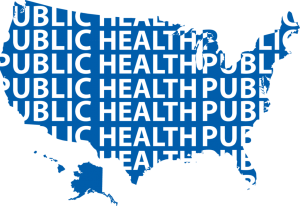
Original graphic from pixbam.com/public-health
There are many reasons for concern regarding the repercussions of a repeal of the Affordable Care Act, also known as Obamacare. Much of the focus as of late has been on the effect repeal would have on Medicaid recipients and how the cost of health insurance would change under a new plan. However, there are many other consequences to repealing parts of the law that are receiving less publicity, but would still have a significantly adverse effect on the quality of public health in this country as we know it.
The Prevention and Public Health Fund
When the ACA was passed in 2010, it included a reserve of funding for public health and prevention interventions, including prevention funding for immunizations, heart disease screenings, and the prevention of disease outbreaks. This fund, called the Prevention and Public Health Fund (PPHF), is mandated under the ACA to receive annual budget allocations and to provide for expanded and sustained investment in public health and prevention interventions. The PPHF accounts for over 12 percent of the Centers for Disease Control and Prevention’s (CDC) annual program budget.
Some of the initiatives made possible by this funding include the CDC’s adult and child immunization program, that protects millions of Americans from infectious diseases, lead poisoning prevention initiatives, chronic disease (diabetes, heart disease, cancer) screenings and prevention programs, and preventing healthcare-associated infections. The CDC uses this money to fund both agency-level programs, and to provide grants to states, municipalities and community groups to support local public health initiatives related to these issues. In 2016, the PPHF provided over $625 million in prevention programming grants to all 50 states and Washington D.C.
Under the proposed changes sought by Republicans to repeal and replace portions of the ACA, budget appropriations to the PPHF will be repealed effective in 2019, and any unobligated monies in the fund at the end of 2018 would be rescinded.
The proposed elimination of this fund is not receiving the same level of press as the proposed cuts to Medicaid and insurance subsidies, but it is nonetheless important. It is not as easy for the average person to qualify the value of prevention programs as easily as one can understand the consequences of taking away someone’s health care, so cuts like this fly under the radar of the general public. However, it is that low level of public scrutiny that make funds like this ripe fruit for lawmakers to slash with little public outcry or political consequence… That is, unless people read articles like this and start voicing their opinions and concerns about the PPHF to their federal and state government representatives.

Original graphic from pixbam.com/public-health
The Importance of Supporting Public Health Prevention Programming
The Oxford English Dictionary defines PREVENTION as the action of stopping something from happening or arising. As it relates to health, that definition is emblematic of just why prevention programs are so important. These programs STOP people from getting sick. They avoid the consequences of medical expenses, illness, death, and lost income by educating people on how to protect their health, and by providing them with the resources to do so. The health interventions at risk of disappearing along with this funding are vaccination programs for infants, smoking cessation programs, interventions that teach people how to eat healthy, increase their physical activity, and reduce or eliminate their risks for Diabetes, high blood pressure or heart disease. Gone will be programs that engage older Americans in physical and mental activities that can protect them from developing dementia in their later years. Areas like Flint, Michigan, which is already facing gross underfunding to fix its lead contaminated drinking water, will have even fewer resources to protect children from the potentially fatal effects of lead poisoning.
The American Public Health Association reports that seventy-five percent of the overall health care costs in this country — a number that exceeds $2.5 trillion annually — is spent treating preventable diseases, yet only 3% of the nation’s health care spending goes towards prevention initiatives. Prevention programs, in addition to preserving health and improving quality of life, just make good economic sense.
To eliminate prevention programs like these will increase the number of sick people in the US who will become afflicted with the conditions these programs previously avoided. Couple that with proposed changes to the nation’s current health care laws that will likely reduce access to health care for many Americans, and you have ingredients for a public health crisis in this country. The people who benefit the most from these prevention programs – the poor, uninsured and under-insured – are also the ones who will suffer the most under the ACA repeal plans.
It is imperative that any changes made to the state of the American health care system ensure the preservation of health of the ENTIRE citizenry. It is equally important that the public not only be aware of the proposed changes, but voice their opinions and concerns so lawmakers make decisions aligned with the public interest. At a minimum, there should be some alternative proposed in the new bill to continue funding prevention programs. The ideal, however, is for the PPHF to remain untouched by the repeal process so it can continue to be of invaluable benefit to the American people and protect the health of its citizens, as that is supposed to be the objective — and is as well the duty — of those reforming the nation’s health care system.



